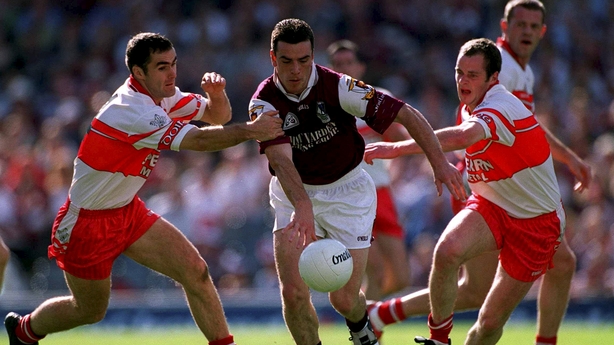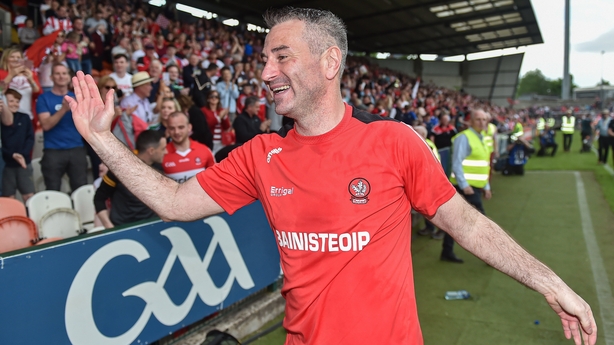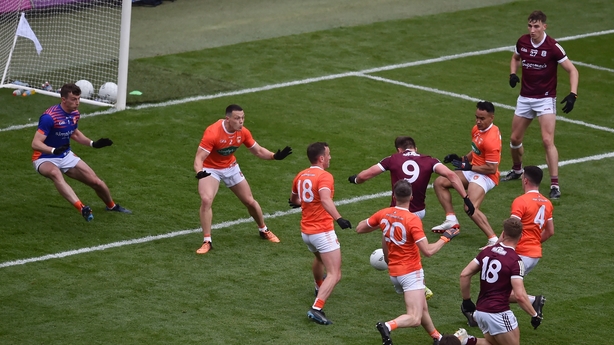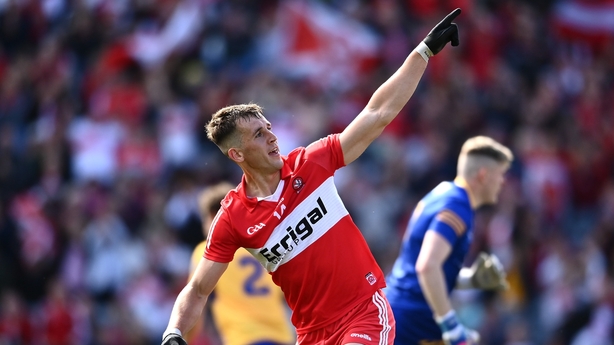We come full circle. In late August 2001, Derry and Galway met in the first All-Ireland semi-final of the inaugural championship played under the qualifier format. Now, as that jaded old system belatedly shuffles off the stage, the pair find themselves matched again in the last-four.
Both teams have undergone decline, re-invention, experienced several false dawns in the meantime before winding up back here, with a golden shot at reaching an All-Ireland final.
The semi-final pairing guarantees a 'novel' or even a 'semi-novel' All-Ireland decider - at least in terms of what we've grown used to (traditionally, Galway's presence in an All-Ireland football final would not have been regarded as novel.)
Of the two, Derry's rise has been considerably more abrupt. Galway have been knocking around just below the top tier, occasionally threatening to join the elite, sometimes resembling 'the real deal', often fizzling out before their time.
Rory Gallagher's side are proper insurgents, nonentities pre-Covid, who are now on the cusp of the most unlikely All-Ireland final appearance since Down pitched up at the showpiece in 2010.

Prior to the current surge, Derry's last experience of the big-time was in the 2014 National League final, when they were blown off the stage by 16 points.
That summer's championship campaign concluded with a home qualifier defeat against Longford and the county were an irrelevance for the remainder of the decade, infamously dropping into Division 4 at the end of 2018.
Gallagher was appointed manager in late 2019 amid limited enthusiasm. They had at least escaped the bottom tier at that point though Chrissy McKaigue observed recently that Gallagher possibly didn't "realise how bad a place Derry were in."
But the raw material was apparently there, waiting to be harnessed. The stock opinion on Derry among outsiders was that they were fixated on the club scene with little time left over for county concerns. Derry sits tied with Armagh in the Ulster club title roll of honour and, unlike in Armagh, their haul isn't largely monopolised by a single club. A whopping seven Derry clubs have won Ulster since 1970.
But that ferociously competitive scene had produced a raft of players. Slaughtneil had left them with McKaigue, Brendan Rogers and the prolific Shane McGuigan.
Gareth McKinless, now 28, was a star defender in Ballinderry's 2013 Ulster club win. Better again, Glen's Conor Glass returned from the AFL after playing four years for Hawthorn. Conor Doherty, Padraig McGrogan and Shea Downey are the emerging graduates from the Ulster U20 winning side of 2018.
Gallagher swiftly implemented the template we've seen elsewhere of heavily manned defences and rapid counters, with runners attacking space from deep.

It was in early 2021 that they began to rip up trees, slaughtering all comers in their shortened Division 3 season, then Fermanagh manager Ryan McMenamin mischievously marvelling at their fitness levels. They were close to a breakthrough in last year's straight knockout campaign but fell marginally short against Donegal, Paddy McBrearty landing a late winner before Derry dawdled long enough in possession that David Coldrick decided they'd used up their chance.
In 2022, they've shot into another stratosphere. Their stunning demolition of All-Ireland champions Tyrone was a major statement, their first win in the province since 2015. McKinless labeled Gallagher a football "genius" after the victory.
When Donegal set out to mirror them in the Ulster final, we were treated to the dreaded 'chess match', either intriguing or mind-numbingly tedious depending on your positioning on the purist scale. Derry proved they could grind it out in such circumstances and Gallagher finally had an Ulster title as a numero uno, after previous final losses with Donegal and his native Fermanagh.
Clare were in over their head in the quarter, Derry mercilessly burying them under a hail of goals, rattling home five before the 50th minute - with five different goalscorers.
Benny Heron added another to his season's tally after lashing home a brace against Monaghan, McKinless again bulled forward to fire another three-pointer, while Paul Cassidy, usually good for a couple of points, rifled one into the top corner stanchion. Glass and McGuigan, the latter carrying much of the point-scoring load, both found the net as the Ulster champions overwhelmed Clare.
Now there, they face another team who spent the spring in Division 2, one who may finally have cracked the code.
Galway reached the last-four in 2018, though garnered very little credit for the achievement, partly due to widespread cribbing about their style of play and partly due to the fact that the semi-final against Dublin got away from them so decisively in the end. That the county's hurlers were All-Ireland champions at the time - and favourites for another - may also have deprived them of some limelight (they drew a very small Galway crowd to HQ for what was a first semi-final appearance in 17 years).
After a year of regression in 2019, Kevin Walsh was gone and another county legend Padraic Joyce, billed as an arch-purist, was elevated from the U20s.
Walsh had laboured hard, from 2015 onwards, to engineer a personality change in Galway football, dispensing with their retro cavalier approach in favour of something more structured and hard-headed, guiding them to two Connacht titles before things ran aground in Year Five. Joyce was initially perceived the man to swing the pendulum back somewhat.
There followed two years when Galway were accused of being too open, particularly in their galling second half implosion against Mayo in last year's Connacht final and again in the Division 2 final last April. However, in the months since, they appear to have found the right blend, marrying a properly resourced, smother defence to their typically stacked forward division.
As usual, Galway's biggest asset is the breadth and depth of their attacking talent. Their scoring efficiency has been especially notable. They registered just three wides as against Mayo's 11 in a tense second half in Castlebar, while their miss tally was similarly paltry in the Connacht final, their starting forwards racking up 2-14 from play.
If Galway are about to grab the baton from Mayo as Connacht's leading protagonists - and the future is uncertain - then the rest of Ireland will be confronting a team with a very different set of strengths and weaknesses.
While the triumvirate of Walsh-Comer-Conroy (billed as a modern day Joyce-Fallon-Donnellon by giddier observers) has attracted most of the attention, the rest of the ensemble has shown their worth.
Rob Finnerty, kept quiet in Castlebar, swung over 0-05 and 0-04 from play against Roscommon and Armagh respectively, Johnny Heaney, one of the most experienced and underrated players in the team, has a great knack of arriving into goalscoring positions.
Matthew Tierney, one of their breakout players in 2021, re-discovered his form in the quarter-final, while Cillian McDaid came of age as a leading player with a magnificent Man of the Match display. It's testament to their depth up front that their only All-Star from 2018, Ian Burke, isn't even involved this season.

Their most naturally gifted attacker Shane Walsh continued to mix the sublime with the occasionally inexplicable. Masterful in the Connacht final, he seemed to chafe under the claustrophobic marking job of James Morgan last time out. Chrissy McKaigue is envisaged as the man to keep tabs on him this weekend. The expected tussle between twin alphas in midfield, Conor Glass and Paul Conroy, is highly anticipated.
Further back the field, Galway were boosted by the reprieve offered to wonderful raiding defender Sean Kelly, bizarrely collared as the fall guy alongside Aidan Nugent for the dreadful melee at full-time against Armagh.
The podcasting fraternity has remained wary of Galway throughout the campaign and it was hard to find a regular talking head tipping them to beat either Mayo or even Roscommon in Connacht. Talk of Galway's supposed 'soft-centre' was cliché for so long that the punditocracy are reluctant to forget. Their horrendous flap at the end of normal time in the quarter-final, and their alarming fadeout in Castlebar, have kept the doubters talking.
Galway have won all three championship encounters between the pair, two of them in All-Ireland semi-finals in 1998 and 2001 and another in slightly less auspicious circumstances in a damp Pearse Stadium qualifier in 2015.
More relevant, however, is the promotion tussle between the sides in the spring - though again, how relevant is the question?
In hurling, where Division 1 has become a protracted series of lavishly over-promoted challenge games, the league actually emerged as a negative predictor. The football league, however, is a far more consequential business and there was plenty on the line in Owenbeg last March, with both teams gunning for promotion.
In the end, we got a surprising blowout. Galway wreaked devastation on the Derry kick-out, goals from Tierney, Damien Comer and Dessie Coneelly firing them into an unassailable 13-point lead by half-time. The win guaranteed Galway's swift promotion back to Division 1 and went a long way to keeping Derry stuck in the second tier, for another year at least.
Much of the discussion in the aftermath centred on Derry's decision to play against a substantial breeze in the first half, which clearly backfired. One significant caveat is that Derry were without primary score-getter McGuigan, sent off in perplexing circumstances in Hyde Park the previous week.

Gallagher recently described the Galway loss as a "turning point" in their season, specifically their calm and measured reaction to what went wrong.
How to call it? Derry have built up a formidable head of steam but the westerners have only a fortnight ago seen off another Ulster side who were coursing with momentum.
The League game is probably an unreliable guide four months on but on the basis of Galway's slightly greater array of scoring forwards, we give them the nod but not without some trepidation.
Named XVs:
Derry: Odhran Lynch; Chrissy McKaigue, Brendan Rogers, Conor McCluskey; Conor Doherty, Gareth McKinless, Padraig McGrogan; Conor Glass, Emmet Bradley; Paul Cassidy, Shea Downey, Ethan Doherty; Benny Heron, Shane McGuigan, Niall Loughlin.
Galway: Conor Gleeson; Liam Silke, Sean Kelly, Jack Glynn; Dylan McHugh, John Daly, Kieran Molloy; Paul Conroy, Cillian McDaid; Patrick Kelly, Matthew Tierney, Johnny Heaney; Robert Finnerty, Damien Comer, Shane Walsh.
We need your consent to load this rte-player contentWe use rte-player to manage extra content that can set cookies on your device and collect data about your activity. Please review their details and accept them to load the content.Manage Preferences
Listen to the RTÉ GAA Podcast at Apple Podcasts, Soundcloud, Spotify, or wherever you get your podcasts.
Follow the All-Ireland Football Championship semi-finals this weekend, Galway v Derry (5.30pm on Saturday) and Dublin v Kerry (3.30pm on Sunday), via our live blogs on rte.ie/sport or on the RTÉ News app. Watch live coverage on RTÉ2 and RTÉ Player with live radio commentary on RTÉ Radio 1


